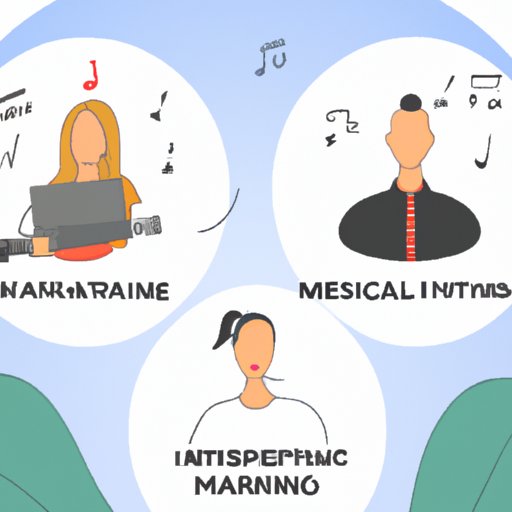Introduction
Managing a music artist is no easy task. It requires a unique mix of business acumen, creativity, and interpersonal skills. From helping to develop an artist’s career path to ensuring their success in the industry, a music manager plays an integral role in the success of any musician. In this article, we will explore what it takes to effectively manage a music artist and provide a comprehensive guide to get you started.
Definition of Managing a Music Artist
A music manager is responsible for overseeing all aspects of an artist’s career. This includes everything from developing and executing marketing strategies to negotiating contracts with record labels. Managers are also responsible for booking gigs, handling day-to-day operations, and providing creative direction. In short, they act as a liaison between the artist and the industry.
Overview of the Challenges Involved
Managing a music artist is not for the faint of heart. There are numerous challenges involved, including but not limited to developing a comprehensive marketing strategy, creating an online presence, managing tour and live performance schedules, negotiating deals with record labels, and monitoring social media engagement. It’s important to be organized and have strong problem-solving skills in order to succeed.

Establishing a Professional Relationship with the Artist
The first step in effectively managing a music artist is to establish a professional relationship. This involves understanding the artist’s goals and objectives, developing an effective communication strategy, and setting clear expectations. It’s important to listen to the artist’s vision and create a plan that best fits their needs.
Understanding the Artist’s Goals and Objectives
It’s essential to understand the artist’s goals and objectives before moving forward. This means taking the time to really get to know them and their music. Ask questions about their creative process, their influences, and their aspirations. This will help you gain valuable insight into their motivations and help you develop a plan that best suits their needs.
Developing an Effective Communication Strategy
Having an effective communication strategy is key to fostering a successful professional relationship. This includes setting up regular meetings, responding promptly to emails and phone calls, and keeping lines of communication open at all times. Establishing trust and respect is essential for a successful working relationship.
Establishing Clear Expectations
Once a rapport has been established, it’s important to set clear expectations. This includes outlining responsibilities, discussing timelines, and establishing a budget. Having a clear plan in place will ensure everyone is on the same page and can help prevent conflicts down the road.

Developing a Strategic Marketing Plan
A well-crafted marketing plan is essential for any music artist. It’s important to identify target audiences, develop a promotional strategy, and utilize social media platforms to reach potential fans. The goal is to create a plan that will maximize exposure and generate interest in the artist’s music.
Identifying Target Audiences
The first step in developing a marketing plan is to identify target audiences. Who is the artist’s music most likely to resonate with? What type of music do they like? Are there certain demographics or geographical locations that should be targeted? Answering these questions will help you create a plan that is tailored to the artist’s specific needs.
Developing a Promotional Strategy
Once target audiences have been identified, it’s time to develop a promotional strategy. This could include anything from radio play to print advertising to online campaigns. It’s important to choose the right channels to ensure maximum exposure and reach the right people. It’s also important to track results and adjust the plan accordingly.
Utilizing Social Media Platforms
Social media is an invaluable tool for promoting a music artist. It’s important to set up profiles on popular platforms such as Facebook, Twitter, and Instagram and use them to connect with potential fans. Posting regularly and engaging in conversations is key to building an audience and promoting the artist’s music.
Creating an Online Presence
In today’s digital world, having an online presence is essential for any music artist. This includes building a website, developing an email list, and participating in online communities. It’s important to create a space where fans can learn more about the artist and stay up-to-date on the latest news and releases.
Building a Website
Having a website is a must for any music artist. It should include information about the artist, their music, upcoming shows, and contact information. It’s important to keep the website up-to-date and make sure it’s easy to navigate. This will help create an online hub where fans can learn more about the artist.
Developing an Email List
Developing an email list is an effective way to keep fans informed about new releases, show dates, and other important updates. It’s important to make signing up for the list easy and send out regular emails. This will help build relationships with fans and keep them engaged with the artist.
Participating in Online Communities
Participating in online communities is another great way to promote a music artist. This could include joining forums and discussion groups related to the artist’s genre or creating content for YouTube and other video streaming platforms. Engaging with fans in these spaces will help create a sense of community and foster loyalty.

Managing Touring and Live Performance Schedules
Touring and live performances are essential for any music artist. It’s important to secure venues, negotiate fees and contracts, and handle logistical details. It’s also important to keep track of expenses and ensure safety protocols are followed. Having a system in place to manage these tasks is essential for any successful tour.
Securing Venues
Securing venues is the first step in planning a tour. It’s important to research potential venues and determine which ones best fit the artist’s needs. It’s also important to consider factors such as size, location, cost, and availability. Having a list of potential venues is key to ensuring success when booking shows.
Negotiating Fees and Contracts
Once potential venues have been identified, it’s important to negotiate fees and contracts. This includes setting ticket prices, discussing rider requirements, and reviewing legal documents. It’s important to ensure all parties are in agreement and have a clear understanding of the terms.
Handling Logistical Details
Managing the logistics of a tour is essential for success. This includes booking flights and hotels, arranging for transportation, and ensuring the necessary equipment is available. It’s important to have a system in place to keep track of all the details and ensure everything runs smoothly.
Negotiating Deals with Record Labels
Negotiating record deals is another important aspect of managing a music artist. It’s important to understand the terms of a record deal, assess potential label partners, and negotiate royalties and advances. Having a thorough understanding of the industry is essential when negotiating these deals.
Understanding the Terms of a Record Deal
Before entering into a record deal, it’s important to understand the terms. This includes things such as royalty rates, copyright ownership, and distribution rights. It’s important to have a thorough understanding of the contract and make sure everyone is in agreement.
Assessing Potential Label Partners
Once the terms of a record deal have been established, it’s important to assess potential label partners. It’s important to research the labels and determine which one best fits the artist’s needs. This includes looking at their track record, their resources, and their reputation in the industry.
Negotiating Royalties and Advances
Negotiating royalties and advances is an important part of any record deal. It’s important to understand the different types of royalties, such as mechanical, performance, and synchronization. It’s also important to negotiate a fair advance and ensure that the artist is properly compensated for their work.
Monitoring Social Media Engagement
Monitoring social media engagement is an important part of managing a music artist. It’s important to set up social media profiles, connect with fans, and measure engagement. Keeping track of activity on social media platforms will help you better understand who is interested in the artist and how to best reach them.
Setting Up Social Media Profiles
The first step in monitoring social media engagement is to set up profiles on popular platforms such as Facebook, Twitter, and Instagram. It’s important to create a consistent look and feel across all platforms and post regularly to keep fans engaged. It’s also important to create a plan for responding to comments and messages.
Connecting with Fans
It’s important to actively engage with fans on social media platforms. This includes replying to comments, answering questions, and sharing content. It’s also important to create meaningful connections with fans by interacting with them on a personal level. This will help create a loyal fan base and foster relationships with potential customers.
Measuring Engagement
It’s important to track engagement on social media platforms in order to understand what is working and what isn’t. This includes measuring likes, shares, comments, and other metrics. Keeping track of these numbers will help you optimize your posts and reach more people.
Conclusion
Managing a music artist is a challenging but rewarding job. It requires a unique combination of business acumen, creativity, and interpersonal skills. From establishing a professional relationship with the artist to developing a strategic marketing plan to monitoring social media engagement, there are many facets to this profession. By following the steps outlined in this article, you can get started on the path to becoming a successful music manager.
Summary of Key Points
This article provided a comprehensive guide to managing a music artist. It discussed topics such as establishing a professional relationship with the artist, developing a strategic marketing plan, creating an online presence, managing tour and live performance schedules, negotiating deals with record labels, and monitoring social media engagement. By following the steps outlined in this article, you can get started on the path to becoming a successful music manager.
Recommendations for Moving Forward
If you’re interested in managing a music artist, the first step is to gain a thorough understanding of the industry. Take the time to research the business side of the music industry and understand the various roles involved. Once you have a solid understanding of the industry, start networking and connecting with artists. By putting in the hard work and dedication, you can become a successful music manager.
(Note: Is this article not meeting your expectations? Do you have knowledge or insights to share? Unlock new opportunities and expand your reach by joining our authors team. Click Registration to join us and share your expertise with our readers.)
